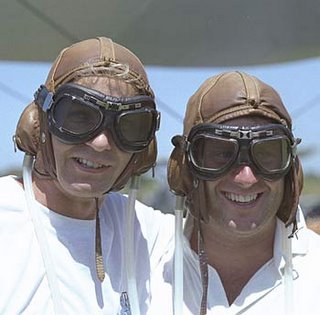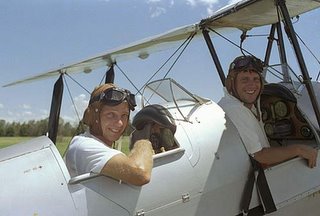When Gower's tour took off
 There was something rather ironic about David Gower and John Morris sharing the same birthday - April Fool's Day. For it was during the 1990-91 Ashes tour that the pair of them decided to have what Gower described as "a little bit of fun", which almost ended in them being sent back home in disgrace.
There was something rather ironic about David Gower and John Morris sharing the same birthday - April Fool's Day. For it was during the 1990-91 Ashes tour that the pair of them decided to have what Gower described as "a little bit of fun", which almost ended in them being sent back home in disgrace.England were not enjoying the best of series, two-down after three Tests, although Gower was in superb personal form with hundreds in both the second and third Tests. The squad then slipped to defeat against New South Wales before heading for a match against Queensland at the Carrara Oval, a venue on the Gold Coast some 50 miles south of Brisbane. But at last they showed form in the game, which was to provide them with their only first-class win of the trip, and on the third day, Morris, whose opportunities had been limited, completed a hundred before getting out within minutes of Gower shortly before lunch.
All the players were aware of the biplanes flying high above the ground throughout the match, and they were also aware that the airfield was nearby. At the break Gower mentioned to Allan Lamb and Robin Smith that he fancied a flight, and Morris, who overheard, eagerly asked to be included in any arrangements. "I did think of asking Graham [Gooch, England's captain]," admitted Gower, "but I knew he would be unhappy with us flying, and as that was the entire point of the exercise, I decided it was best not to mention it at all."
The airport was close enough to reach in a few minutes, and also to ensure that were England, four-down at the time, to collapse then the pair would be back in time to field. On arrival, they had to wait for a flight on the aptly-named Joy-Ride company's planes, but after checking that Smith and Lamb were still batting, they each climbed into a pre-war Tiger Moth and took off.
Gower had already persuaded his pilot to indulge in some low flying - the planes were supposed to stay over 2000 feet but in the event they buzzed the Oval at nearer 200. They dipped down moments after Smith completed his own hundred and Lamb, who knew who was in them, playfully pretended to shoot them down with his bat. No-one else was any the wiser.
However, one of the pilots had tipped off the press before take-off, and Adrian Murrell, a photographer covering the trip, thought he recognised the passengers through a telephoto lens. By the time they landed, there was a reception committee.
 When Gower and Morris sneaked back into the dressing-room, Gooch asked: "That wasn't you two up there by any chance, was it?" Gower recalled that he "put on my best choirboy face and said something like: 'Who, me? Heavens, no'." But events were quickly moving on.
When Gower and Morris sneaked back into the dressing-room, Gooch asked: "That wasn't you two up there by any chance, was it?" Gower recalled that he "put on my best choirboy face and said something like: 'Who, me? Heavens, no'." But events were quickly moving on.The press corps had been alerted (for a time stories did the rounds that Gower had considered dropping a water bomb on the pitch) and they asked Peter Lush, the team manager, for a comment. He was livid and immediately went to confront the two aviators. But by this time they were back at the airport posing for another photographer, Graham Morris, who had missed the fly-by pictures.
When Morris returned to the hotel he was, to quote Gower, "ambushed by a steaming Lush in the lobby who demanded to know what had been going on ... John Morris puffed in shortly afterwards and was pounced on by this human volcano." Lush wanted an immediate inquiry. Gower, however, inadvertently raised the manager's blood pressure several more notches - he had gone out to dinner.
Morris rang Gower at the restaurant and warned him trouble was brewing and said Lush wanted to see him immediately. Gower, almost inevitably, was not about to abandon dinner and a bottle of 1987 McLaren Vale Chardonnay to be chastised as if he was a naughty schoolboy. He returned to the hotel to find three notes from Lush, each one increasingly irate, summoning him to an 8.15am hearing.
Gower and Morris were faced with a stony-faced panel consisting of Gooch, Lush, Lamb and Mickey Stewart, the coach. Stewart kicked off by complaining he had had to get up early, and it went downhill from there on in. "You can either be heavy about it or you can treat it as harmless prank," Gower told them. No guessing which they chose. But Gooch then questioned Gower's commitment and a heated discussion ensued.
Common sense would suggest that the senior player should have privately be told not to be such a fool and that the less-experienced Morris should have been given a sharp reprimand. But that was not the way England functioned back then. "What followed was reflective of the attitude at that time," Gower recalled. "Gooch and Stewart were very regimental in their dealings at the time. It was a one-rule-for-all-types regime, which didn't allow someone to have a little bit of fun."
The pair were fined £1000 each, the maximum allowed under their contracts, which made no distinction between senior and junior player. For Morris, who received £15,000 for the whole four-month trip, that was quite a slap. "I think they over-reacted in punishing us, and I've always said that," Gower explained. "My biggest disappointment about that incident was that my form slumped. I had been playing very good cricket up until then. Whether it was psychological or not, my form was miserable in the final two Tests. I had all sorts of personal reasons for wanting to do well and it just went downhill. I don't regret the incident; I just regret the lapse of form after the incident."
 "They let us down badly," Gooch countered. "What if the rest of the team, especially the younger ones, thought that sort of behaviour was par for the course?"
"They let us down badly," Gooch countered. "What if the rest of the team, especially the younger ones, thought that sort of behaviour was par for the course?"The pair were left to sweat until the eve of the fourth Test at Adelaide before Lush summoned them, told them of the fine, and said he was about to issue a press release labelling the incident "immature, ill-judged and ill-timed." Gower told Lush he thought he had over-reacted, and left. It is worth noting that Lush was the tour manager in Pakistan three years earlier when Chris Broad had refused to leave the field after being given out and Mike Gatting had his infamous spat with Shakoor Rana. Not only were they not punished, but they actually received, with the rest of the squad, a £1000 hardship bonus!
Publicly, Gower was cool and unbothered, telling the press that he thought £1027 (the fine plus the cost of the flight itself) was a bit steep for a 20-minute jaunt; privately, he seethed. Relations between him and Gooch were at rock-bottom and never really recovered. Gower made only 11 and 16 at Adelaide.
It later emerged, via Lamb, that the panel had discussed sending both players home, but that had only been dismissed because the side was doing so badly.
 "One would hate to think that it has become a crime to enjoy a cricket tour," noted Christopher Martin-Jenkins in The Cricketer, while in Wisden Cricket Monthly, David Frith, Gower's dinner companion on the night of the flight, wrote: "The fines should ensure that no England player in future will even dare to look up from his crossword puzzle while a match is in progress."
"One would hate to think that it has become a crime to enjoy a cricket tour," noted Christopher Martin-Jenkins in The Cricketer, while in Wisden Cricket Monthly, David Frith, Gower's dinner companion on the night of the flight, wrote: "The fines should ensure that no England player in future will even dare to look up from his crossword puzzle while a match is in progress."There was no happy ending. Gower, one of the most naturally gifted batsmen of his generation, played only three more Tests after that series, and England were the poorer for it. It was never said, but in the all-work-and-no-play environment fostered by Gooch and Stewart, there was no place for him. His omission from the 1992-93 tour of India caused a huge row which culminated in a public meeting attended by thousands demanding his inclusion. It never happened. Morris never pulled on an England sweater again, despite being one of the country's leading batsmen until his retirement in 2001.
Earlier in the tour Lamb and Gower had been in trouble after being seen at a casino with Kerry Packer and Tony Greig during the first Test at Brisbane. The pair left at midnight and no action was taken against them. Lamb, who was standing in for Gooch as captain, was at the crease overnight and added only four to his score the next morning, his dismissal triggering a collapse which resulted in defeat.

